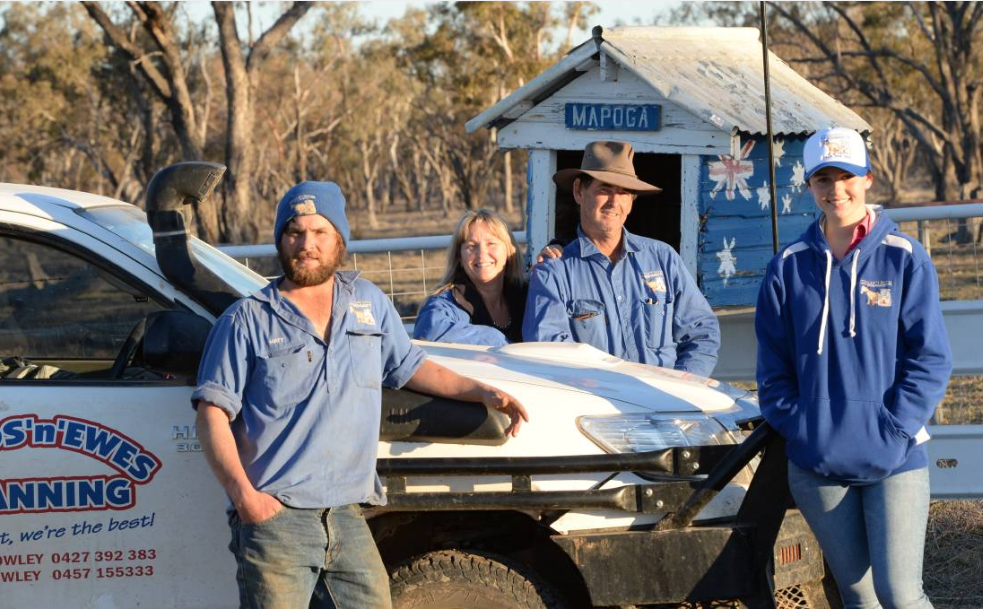2 Woodcourt st 'mapoga'
da201900187 demolition application
Marrickville's first political giant
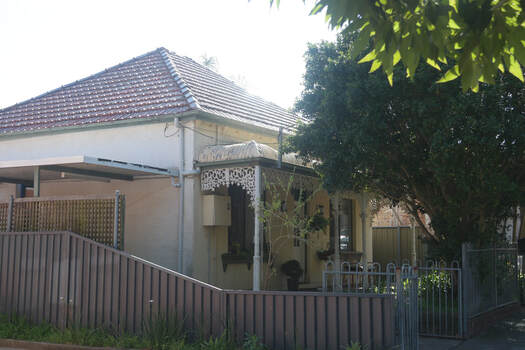
Marrickville’s federal representative is now part of our suburb’s popular culture. Whatever your politics you can’t deny that Albo is bigger than his job, truly dedicated to his electorate and especially his beloved Marrickville. At the end of the 19th century, when Australia was a group of separately governed colonies, we also had a giant of politics living in our suburb, a man who transcended state politics, who was part of the debate around Federation and represented New South Wales in the Federal Parliament as a senator from 1901 until his death in 1923. He lived in Marrickville for more than 20 years. It was his first Sydney home, the place where he found his political feet and was a refuge for his family while he travelled relentlessly for work. His family home at 2 Woodcourt Street, his first home in Marrickville, where for ten years he escaped public and political scrutiny, enjoyed his homing pigeons and simply being a husband and father to two little girls is now to be demolished. I bring you the story of Edward Davis Millen, Marrickville’s first giant of Federal politics.
Edward was born in England in 1860 and at about the age of 20 left his job as a clerk in an insurance office and emigrated to New South Wales for the biggest adventure of his life. He headed to Walgett to try his hand at grazing. Working as a station hand in the Australian outback couldn’t have been more different from his world in England but he embraced his new life and his new country with enthusiasm and zeal, so much so that his older brother Ernest followed him out in 1882. In Walgett Edward met Constance Flanagan (known as Evelyn) and they married in 1883 then took up the lease on a sheep station called ‘Mapoga’, ten kilometres from Brewarrina.
Although he dedicated ten years to the sheep station, Edward found a stronger calling. He was drawn to the larger town of Bourke, about 100 kilometres from Brewarrina where he got a job as a journalist and began to take a visible interest in local affairs. He advocated for a local chilled meat depot in Bourke so the graziers could compete in the Sydney market, and was nominated as a delegate to be sent to Sydney to petition the Minister for Works for a railway line and bridges on the back creeks. Edward’s visit to Parliament House in Sydney ignited a spark that would become an inextinguishable flame in him.
In 1889 he founded his own newspaper, the Western Herald and Darling River Advocate and was able to give a voice to the issues that consumed him. His life was a busy one, travelling between Mapoga and Bourke and even further when local issues warranted it.
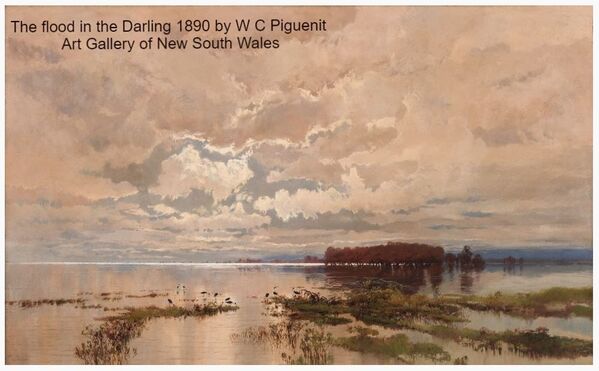
And then it rained.
People familiar with Marrickville history will recall the famous Tramvale flood of June 1889 where nearly 300 acres of our suburb close to where Sydenham Train Station is now, was submerged under 4 feet of water. The following April, the New South Wales outback bore the brunt of the deluge. The rains began in Queensland and the Culgoa River became a torrent. Rushing to meet the Barwon River between Bourke and Brewarrina it then becomes the Darling River, Australia’s greatest outback river. The Darling River is 1472 kilometres long but when including its tributaries, stretches to 2844 kilometres. It drains all of New South Wales west of the Great Dividing Range. And when it floods the pain is felt everywhere.
Bourke's hospital and jail were cleared. Women and children were packed onto trains and sent to safety while the rails were still intact. Bourke’s steamer was busy shunting people to higher ground. Horrified residents watched as sheep, cattle and horses floated past the town from the cataclysm upriver.
And the Darling River rose.
At Mapoga, the Millens watched the normally sedate Cato Creek cascade through their land, turning it into a lake. They had no means to escape the assault, only a boat would suffice. There was nowhere to escape to anyway, Brewarrina was under water. They needed to get to higher ground and that was on the neighbouring property four miles away. Edward and Evelyn along with a house guest and a station hand made preparations to leave. At 4pm on 17th April they strapped timber planking to two iron tanks and climbed aboard their makeshift raft to float out. As night fell and they grew fearful, they secured the raft to a tree and waited until morning before restarting the journey. Finding a small island close to the neighbour’s property, the raft was beached and Edward waded through the water to George Harden’s homestead where he borrowed a buggy and a pair of horses. He returned to the island for the others and they eventually fell exhausted into the Harden’s kitchen 30 hours after they had set off from Mapoga. Although now safe, they had lost 2,000 sheep and were changed forever. The next year the Millens bought a house in Bourke and left the land.
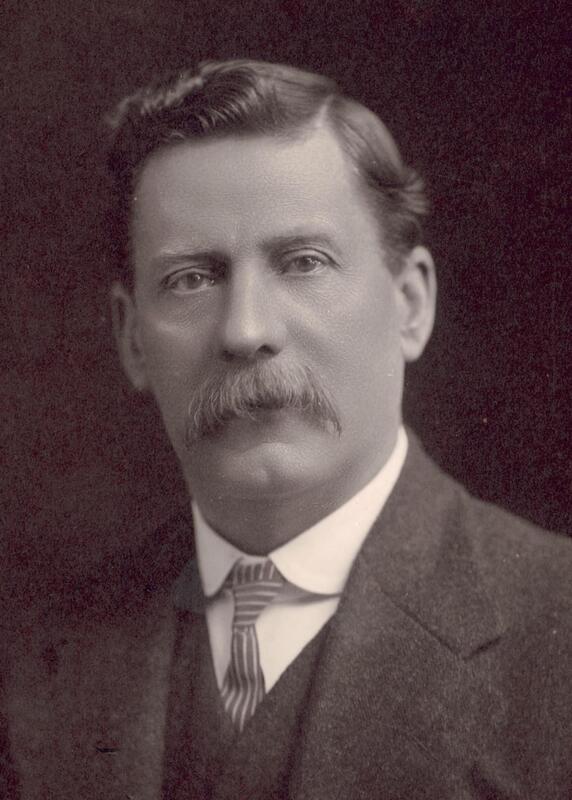
Edward became a member of the Free Trade Party. This was one of New South Wales earliest political parties and its single aim was to abolish tariff protection of imports into Australia and between the colonies. Tariff protection had been imposed in 1800 by Governor King. It was an enormous revenue earner for the colony and also helped built manufacturing industry in New South Wales by substantially increasing the cost of imported goods. One hundred years after settlement the colony was much better established and the Free Traders argued that removing tariff protection would stimulate the local economy and incentivise local industry to meet best practice. In their view, greater wealth would be created for all. Edward had a vested interest in removing the tariffs as the Australian wool industry was attempting to break into the American market with its superior merino wool. America had imposed a tariff on wool imports which was stifling the plan. The Free Trade Party was diametrically opposed to the Protectionist Party whose single issue was to retain tariff protection in order to support local industry growth and employment. Both parties had been formed in 1887 in time to challenge for the 1887 colony election. In that year Henry Parkes led the Free Trade party to victory.
In the 1891 election Edward faced off as the only Free Trader against five Protectionists plus one representative of a brand new political party – the Labour Electoral League (the antecedent of the Australian Labor Party). The 1891 election was Labor’s first contest in New South Wales and their Bourke candidate Hugh Langwell polled highest to become MLA for Bourke. George Dibbs, the leader of the Protectionist Party became Premier.
Undeterred, Edward began preparations for the next election to be held in 1894. He surrendered the lease on Mapoga and purchased a house recently built in Marrickville by local builder Sydney Cabban. The house at 2 Woodcourt Street was named ‘Mapoga’ as a reminder of his treasured time in the outback. He had taken on a partner in the newspaper business several years earlier and was now free to mount his election campaign. As well as advocating for the families who lived on the land he spoke passionately about the unification of the Australian colonies, an ideal which had been brought back into the public conscience by Henry Parkes during the 1890s.
In the 1891 election Edward faced off as the only Free Trader against five Protectionists plus one representative of a brand new political party – the Labour Electoral League (the antecedent of the Australian Labor Party). The 1891 election was Labor’s first contest in New South Wales and their Bourke candidate Hugh Langwell polled highest to become MLA for Bourke. George Dibbs, the leader of the Protectionist Party became Premier.
Undeterred, Edward began preparations for the next election to be held in 1894. He surrendered the lease on Mapoga and purchased a house recently built in Marrickville by local builder Sydney Cabban. The house at 2 Woodcourt Street was named ‘Mapoga’ as a reminder of his treasured time in the outback. He had taken on a partner in the newspaper business several years earlier and was now free to mount his election campaign. As well as advocating for the families who lived on the land he spoke passionately about the unification of the Australian colonies, an ideal which had been brought back into the public conscience by Henry Parkes during the 1890s.
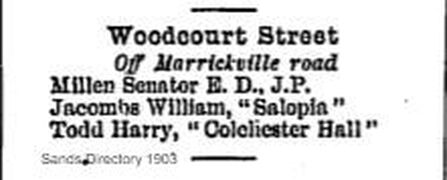
In 1894 Edward stood again and defeated Hugh Langwell becoming MLA for Bourke. Statewide, the Free Trade Party had won this election, but under Edward’s mentor George Reid. The Millens moved to Marrickville permanently much to the relief of Evelyn who by this stage had an infant daughter.
After Henry Parkes retired from politics, Edmund Barton became the driving force behind Federation. Edmund was a delegate to the constitutional conventions and had a key role in drafting the national constitution. He had no clear affiliation to either the Free Traders or the Protectionists and Edward Millen became distrustful and increasingly concerned about the direction Federation was taking. He began to put the brakes on going so far as to become a founding member of the Anti-Convention Bill League. He agitated for a ‘No’ vote at the referendum on Federation that would be held during the 1898 election. As a result, he lost his seat at Bourke. The Free Traders formed a minority government in Macquarie Street with the support of the Labor Party. With the Free Trade Party still under the leadership of George Reid, Edward was personally nominated by George as one of twelve new members of the Legislative Council in New South Wales. Another referendum on Federation was to be held in 1899 and George wanted to ensure New South Wales’ commitment to Federation. Edward finally pledged his support to Federation.
After Henry Parkes retired from politics, Edmund Barton became the driving force behind Federation. Edmund was a delegate to the constitutional conventions and had a key role in drafting the national constitution. He had no clear affiliation to either the Free Traders or the Protectionists and Edward Millen became distrustful and increasingly concerned about the direction Federation was taking. He began to put the brakes on going so far as to become a founding member of the Anti-Convention Bill League. He agitated for a ‘No’ vote at the referendum on Federation that would be held during the 1898 election. As a result, he lost his seat at Bourke. The Free Traders formed a minority government in Macquarie Street with the support of the Labor Party. With the Free Trade Party still under the leadership of George Reid, Edward was personally nominated by George as one of twelve new members of the Legislative Council in New South Wales. Another referendum on Federation was to be held in 1899 and George wanted to ensure New South Wales’ commitment to Federation. Edward finally pledged his support to Federation.
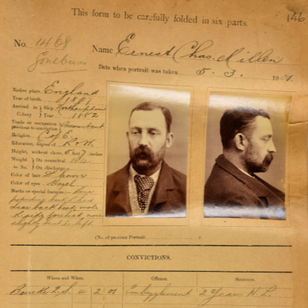
The Commonwealth of Australia Constitution Act was passed and in 1901 Australia gained a Federal Constitution. Edward’s goal was to represent New South Wales in the Senate but events within his family threatened to derail his ambition. His brother Ernest who was still living in Bourke and had been working for the local Council since 1890 was arrested for defrauding the Council. In February 1901, Ernest was found guilty of embezzlement and was sent to Goulburn Gaol for two years of hard labour. Remarkably, or perhaps by design, the conviction was not reported in the Sydney newspapers, and the rural press did not link Ernest to his very public brother. Eight weeks later Edward stood for the Senate and was elected. He resigned from his position in the New South Wales Legislative Council in May and remained a Senator for the rest of his life.
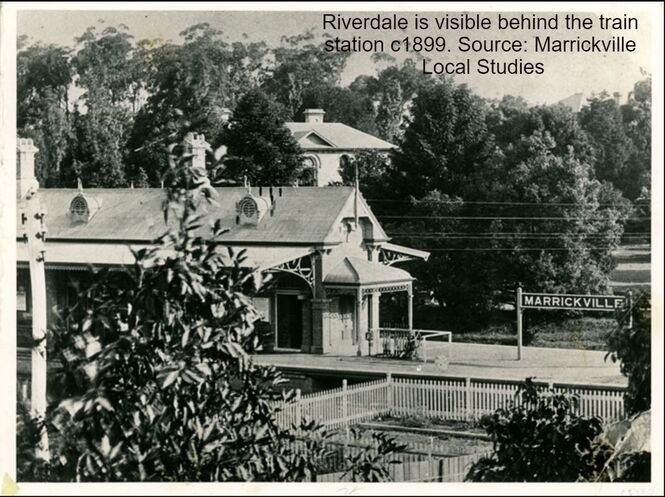
Travelling to and from work became a lot more involved once Melbourne was nominated as the temporary home of Australia’s new parliament. In 1903 the Millens moved from Woodcourt Street to ‘Riverdale’ in Illawarra Road, a magnificent home that stood between the Marrickville Train Station and Schwebel Street. This house was better suited for Edward who could use the train to travel between Marrickville and Melbourne on the railway line that had opened between the two cities in 1883.
Over the next few years Edward would become the Leader of the Government or Leader of the Opposition in the Senate depending on which party was in power, and his party affiliation fluctuated as the power of the Labor Party burgeoned and the Protectionists and the Free Traders reinvented themselves in order to form a viable alternative. The Free Traders became the Anti-Socialist Party, then in 1909 merged with the Protectionists to become the Commonwealth Liberal Party.
Edward was an intelligent man, eloquent from years of lively journalism and the fastest speaker in parliament, being clocked at 200 words per minute. He tested the shorthand of every reporter in his vicinity and gained a reputation as one of the ablest politicians in parliament.
Over the next few years Edward would become the Leader of the Government or Leader of the Opposition in the Senate depending on which party was in power, and his party affiliation fluctuated as the power of the Labor Party burgeoned and the Protectionists and the Free Traders reinvented themselves in order to form a viable alternative. The Free Traders became the Anti-Socialist Party, then in 1909 merged with the Protectionists to become the Commonwealth Liberal Party.
Edward was an intelligent man, eloquent from years of lively journalism and the fastest speaker in parliament, being clocked at 200 words per minute. He tested the shorthand of every reporter in his vicinity and gained a reputation as one of the ablest politicians in parliament.
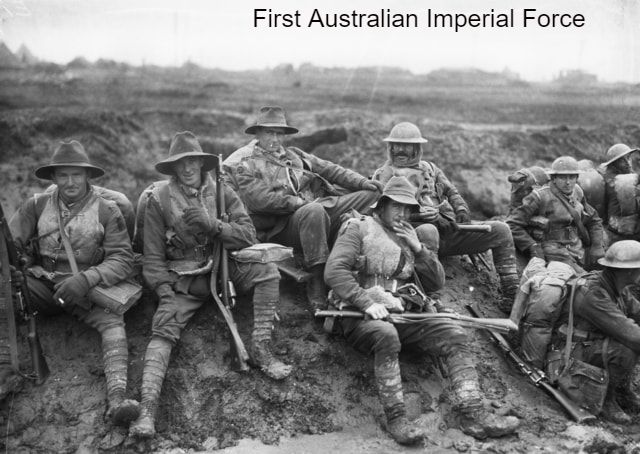
In 1913, the Liberal Party came to power and Edward was given a ministerial portfolio. It was the worst possible responsibility one could be given in 1913, Minister for Defence. When war was declared in 1914 Edward was given the task of supervising the recruitment of and equipping an initial 20,000 men for the Australian Imperial Forces. Showing the extent to which he was now a proud Australian, he railed against Winston Churchill who had demanded the Royal Australian Navy be sent to Europe to support the British war effort. He was overruled and the ships were sent, but as compensation the Australian fleet was supplemented by the British Royal Navy after the end of the war. In September 1914 Labor came to power and Edward was probably relieved.
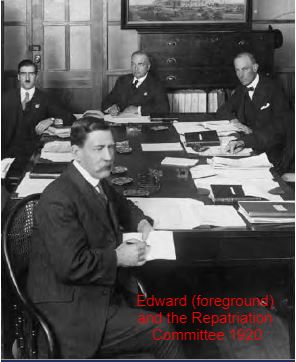
In 1916 a severe disagreement within the Labor Party over proposed conscription erupted. Labor Prime Minister Billy Hughes was an advocate and planned a referendum. Six ministers resigned in protest and Billy was expelled from the New South Wales branch of the Labor Party. The referendum was defeated and as the Labor caucus was preparing to expel Billy, he and 23 supporters resigned and formed a new party – the National Labor Party which was able to form a minority government with Billy at its helm and supported by the Liberal Party. National Labor and the Liberal Party merged to form the Nationalist Liberal Party and won the 1917 federal election.
Edward now found himself in a new political party and was given an even worse portfolio than his previous one. It is widely believed that the stress of becoming the Minister for Repatriation led to his death. He was charged with rehoming, training and providing medical services to 160,000 returned soldiers plus caring for widows and children. This role was the pinnacle of Edward’s career. He created Australia’s war pension scheme and formed the first repatriation administration which included the War Services Homes Commission. Marrickville is full of homes that were purchased by the Commission to house returned soldiers. Edward was industrious and competent but he had a highly visible portfolio and a new department filled with returned soldiers who were enthusiastic but inexperienced. He was criticized mercilessly but graciously accepted responsibility for the errors of his officials.
Edward now found himself in a new political party and was given an even worse portfolio than his previous one. It is widely believed that the stress of becoming the Minister for Repatriation led to his death. He was charged with rehoming, training and providing medical services to 160,000 returned soldiers plus caring for widows and children. This role was the pinnacle of Edward’s career. He created Australia’s war pension scheme and formed the first repatriation administration which included the War Services Homes Commission. Marrickville is full of homes that were purchased by the Commission to house returned soldiers. Edward was industrious and competent but he had a highly visible portfolio and a new department filled with returned soldiers who were enthusiastic but inexperienced. He was criticized mercilessly but graciously accepted responsibility for the errors of his officials.
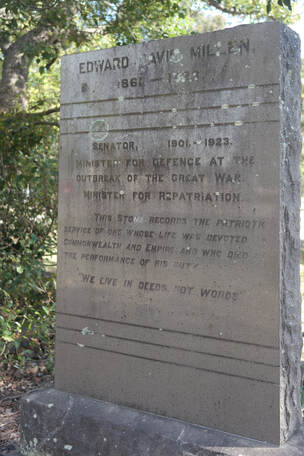
Edward was one of Billy Hughes’ closest colleagues and while Billy was absent in July 1919 Edward became acting prime minister. In 1920 he was Australia’s representative at the very first General Assembly of the League of Nations. His work ethic was intransigent but his health suffered. He died in Melbourne in August 1923, just three weeks after work began on building the new parliament house at Canberra. He was given a state funeral at Parliament House in Melbourne and then his remains were returned to Sydney for interment at Rookwood.
His gravestone commemorates the “patriotic service of one whose life was devoted to Commonwealth and Empire and who died in the performance of his duty”.
Billy Hughes claimed of Millen that “No man did more to make this country what it is than Senator Millen”.
Edward spent 20 years of his life living in Marrickville but travelling the length and breadth of Australia. His second home ‘Riverdale’ was demolished in 1920 and now his first home faces the bulldozer. But his legacy lives on at Brewarrina where the Crowley family continue to face down droughts and flooding rains as they work the land that is still called ‘Mapoga’.
Vale Edward Davis Millen.
His gravestone commemorates the “patriotic service of one whose life was devoted to Commonwealth and Empire and who died in the performance of his duty”.
Billy Hughes claimed of Millen that “No man did more to make this country what it is than Senator Millen”.
Edward spent 20 years of his life living in Marrickville but travelling the length and breadth of Australia. His second home ‘Riverdale’ was demolished in 1920 and now his first home faces the bulldozer. But his legacy lives on at Brewarrina where the Crowley family continue to face down droughts and flooding rains as they work the land that is still called ‘Mapoga’.
Vale Edward Davis Millen.
The Crowley family at Mapoga today (photo from: The Resilient Crowleys, by Mark Griggs, www.theland.com.au)
Copyright © 2019 Marrickville Unearthed. All rights reserved.
Copyright © 2019 Marrickville Unearthed. All rights reserved.

